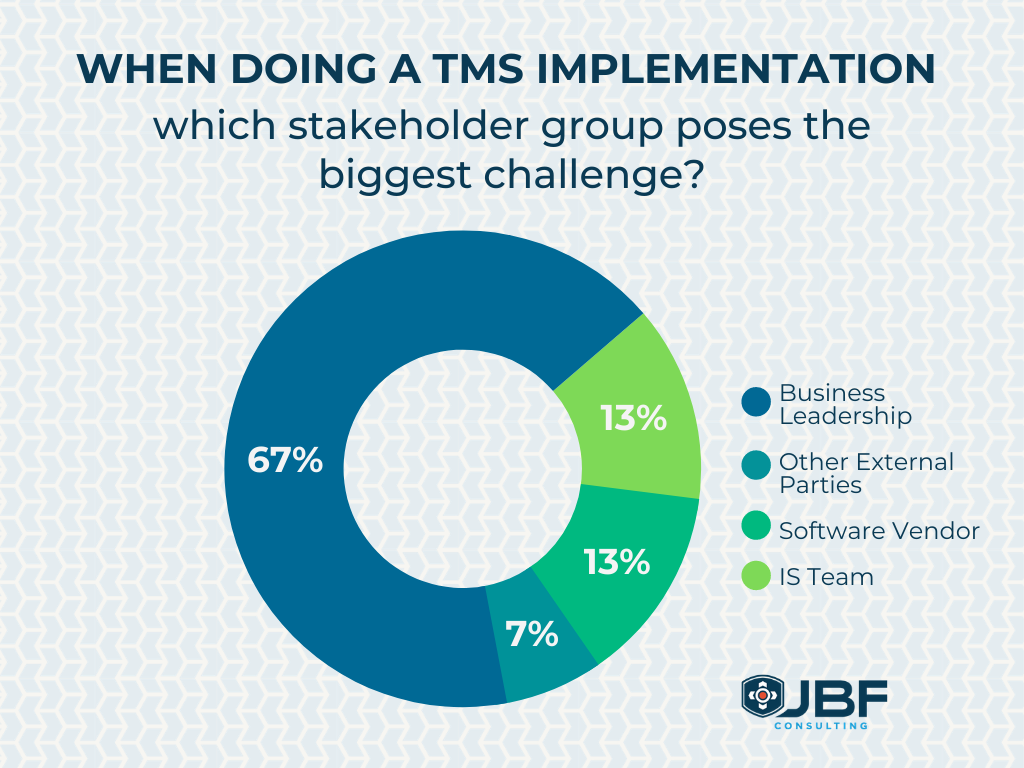When doing a TMS implementation which stakeholder group poses the biggest challenge?
The offered response options were 1) IS Team, 2) Business Leadership, 3) Software Vendor, and 4) Other External Parties.
Participants in the poll came from 3PLs, consulting, and shippers so they represented a pretty good cross-section.
Realizing all respondents come from a different perspective, I was a bit surprised that the clear winner (or loser) was Business Leadership by a large margin. In retrospect, perhaps the question was a bit obtuse and open to interpretation (is “challenge” a good thing or a bad thing?).
I expected either the IS Team or the Software Vendor to rank much higher, even taking the top spot. But given the results, let’s lean into them a bit and offer some insights from the perspective of a TMS implementation and consulting firm.

“Just because someone has domain expertise and knows the logistics functions inside and out, does not mean they are well-suited to drive a project to successful completion.”
Starting with the Software Vendor, this would be an easy target because most of us have experienced, or at least heard of, vendors that sell solutions that may not be fully baked, are not fully vetted by the client, or what was sold was not clearly communicated to the technical team(s) supporting implementation.
Regarding the IS (IT) Team, in most organizations they are a support function to the business. The business sets the vision and formulates tactics to realize the vision, and IS executes technology to meet the requirements. There are times though that IS becomes a roadblock or is in a position to drive decisions for the business.
- It may be that there is a contentious relationship.
- IS may be overwhelmed with ongoing projects.
- Or perhaps the business has outgrown IS and they just don’t have resources.

“Business Leadership identified as the biggest challenge in a TMS implementation underscores the value of an external consulting partner to guide the business through the journey.”
As I think more about Business Leadership being a challenge to TMS implementations a few thoughts come to mind as to why respondents called them out:
- Executives are not fully engaged, and projects get bogged down by a lack of critical decision-making;
- Executive or senior leadership may not be used to interacting with each other on a tangible project. Internal politics or conflicting objectives will derail a project in short order;
- Organizational culture may be one of consensus-building and that may slow access to resources and decision-makers;
- Mid-level leaders or sponsors of the implementation may not have done an appropriate level of socializing the project across the organization and therefore it is operating in a vacuum;
- A project charter with expectations and roles may be missing or lacking in sufficient detail. Therefore, assumptions get made or important tasks missed;
- Certain personalities may just not be well-suited to lead a project. Just because someone has domain expertise and knows the logistics functions inside and out, does not mean they are well-suited to drive a project to successful completion. Project management isn’t for everyone.
Business Leadership identified as the biggest challenge in a TMS implementation underscores the value of an external consulting partner to guide the business through the journey. One who has seen best practices. One who has rescued projects that are rudderless. One who can take on roles to get the ship on course. If your consulting partner doesn’t have these qualifications, it may be time to reassess.
Before embarking on a TMS (or any other technology) implementation project, take a hard look at the business team and leadership.
- Are the culture and stakeholders mature enough to take on a transformational challenge?
- Do they have a thorough understanding of what the future state will be?
- Does the collective teams have the skills to properly manage the project - organizational skills, communications skills, and authority to drive decisions?
Business Leadership - if you think that this is solely an IS/IT project, I can promise you that you will be disappointed along the way; the business must take a leadership position and maintain it through the project. Communication and collaboration are critical across all stakeholders.
Reference: Original LinkedIn Poll post
Dennis Heppner is a Principal at JBF Consulting. Dennis’ expertise in transportation, logistics and supply chain operations, and third-party providers spans 25+ years. His experience is broad-based, spanning entire supply chains, including business process redesign, sourcing, distribution network design, transportation management, distribution operations, outsourcing selection, and business strategy for major manufacturers, distributors, retailers including eCommerce, and service organizations.
About JBF Consulting
Since 2003, we’ve been helping shippers of all sizes and across many industries select, implement and squeeze as much value as possible out of their logistics systems. We speak your language — not consultant-speak – and we get to know you. Our leadership team has over 70 years of logistics and TMS implementation experience. Because we operate in a niche — we’re not all things to all people — our team members have a very specialized skill set: logistics operations experience + transportation technology + communication and problem-solving skills + a bunch of other cool stuff.



